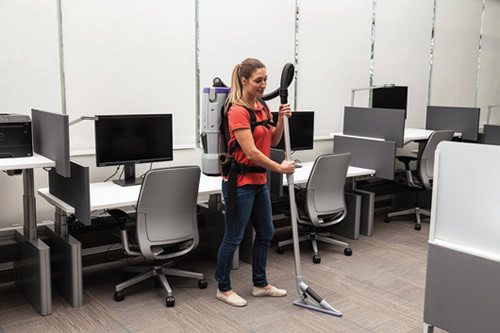University of Washington
Project Snapshot
PROJECT: System for Collaborative Process Improvement
INSTITUTION: University of Washington
LOCATION: Seattle, WA
COMPANY NAME: ProTeam
WEBSITE: proteam.emerson.com

A focus on providing clean, safe facilities in which to learn is important for colleges and universities. Healthy facilities allow for healthy building occupants.
THE CHALLENGE
The University of Washington is one of the world’s top institutions of higher education. Ranked 13th on the 2017 Academic Ranking of World Universities, the university states its mission as “the preservation, advancement, and dissemination of knowledge.” In pursuit of that mission, the Building Services Department of the Seattle campus maintains 12 million square feet of facility space to a high standard of cleanliness and health.
“Our primary task is to create a quality environment that is conducive to learning—a home away from home for our students,” says Gene Woodard, director of Building Services. “There are places that need to be in showplace conditions to represent the university well. We want to attract the best researchers, professors, and students. How the university looks is a key part of creating a good impression.”
With a prior career in hospital maintenance, Woodard has been with University of Washington for 32 years. In his tenure, the custodial team has reworked many cleaning practices to be more environmentally friendly, people friendly, and efficient.
Of the 280 custodians in the building services department, 140 are involved in lean process improvement where groups of custodians work on shared problems. As the groups generate ideas, mostly related to workplace safety and quality of cleaning, they track each idea to completion. In the last year, the team generated about 1,200 ideas, of which, 900 were successfully implemented.
THE SOLUTION
This system of process improvement has given birth to a culture of engagement throughout the department. Through it, groups of custodians have solved long-standing problems. For example, since the mid-’90s, custodial management preferred for frontline cleaners to use backpack vacuums.
“We wanted to be more productive, and we saw that the backpacks could vacuum more space in half the time as uprights, so the switch to backpacks was motivated by productivity and also ergonomics. But the ergonomic side has been a longer journey to learn,” says Woodard. “Initially there seemed to be some stigmas to the backpack vacuum. Some people just felt that they didn’t want to use it.
In 2015, the department conducted a survey of 160 custodians on 16 different tasks that custodians do routinely. The survey revealed which routine tasks created discomfort for custodians, and backpack vacuuming was one of them.
“We created groups to work on the tasks that were causing discomfort,” says Woodard. “That’s when we realized that we were doing a very poor job of training people on how to properly fit the backpack vacuum harness.”
The group observed people vacuuming with the backpack vacuum swinging back and forth on their shoulders, bumping them in the hips. Some of the backpack harnesses had straps tied in knots, and some workers weren’t fastening the buckles at all.
Woodard reached out to the manufacturer for help. ProTeam® and the local reps brought out a team of people to do a comprehensive training on backpack vacuums. The university also brought in a couple of ergonomists to assist. They conducted the training for three days, helping each custodian get a comfortable and ergonomic fit. Three months later they resurveyed the staff, and found there was significant improvement in comfort while using the backpack vacuums.
“Now, we are probably at 100 percent of our staff using the backpack vacuums,” says Woodard. “You can’t underestimate the importance of training and reinforcing what people learn. Custodians have a big workload and a lot on their minds. We emphasize the role of the leader in reinforcing training.”
Michael Nguyen, training and special project manager for Building Services, chaired a lean process improvement group to tackle stairwell safety. They were concerned about trips and slips on the stairs. The group observed stairwell cleaning and discovered that everyone was doing it differently: some cleaned from top to bottom, some from bottom to top, and some cleaned backwards. The group recommended moving to cordless backpack vacuums for stairwell cleaning with a few other safety guidelines: clean from the bottom up and never go backwards.
IMPACT ON LEARNING
The group’s solution had a second benefit of improving productivity. A stairwell of seven flights from basement to top floor took 30 minutes to clean with a standard backpack vacuum. With the GoFree® Flex Pro cordless backpack vacuum from ProTeam, it takes only 10 minutes.
“Everyone loves the cordless,” says Nguyen. “It cuts down the time spent versus the corded backpack vacuum. There is no cord to get stuck under furniture or partitions. It eliminates the tripping hazard for the custodian and for the student.”
Editor’s Review
A structured maintenance program is a cornerstone of academic performance and IAQ. The U.S. EPA’s study, “How Does Indoor Air Quality Impact Student Health and Academic Performance?” indicates that substandard environmental conditions, such as inadequate cleaning, can cause chronic health problems for building occupants. By focusing on improving their custodial cleaning program, the University of Washington is promoting student success.